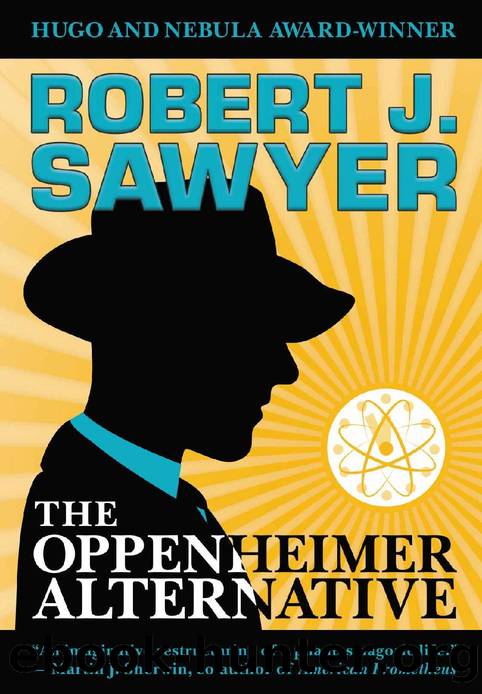The Oppenheimer Alternative by Robert J. Sawyer

Author:Robert J. Sawyer [Sawyer, Robert J.]
Language: eng
Format: epub
Publisher: SFWRITER.COM Inc.
Published: 2020-06-01T23:00:00+00:00
Chapter 29
As a direct result of Oppenheimer’s work, we now know that black holes have played and are playing a decisive part in the evolution of the universe. He lived for twenty-seven years after the discovery, never spoke about it, and never came back to work on it. Several times, I asked him why he did not come back to it. He never answered my question, but always changed the conversation to some other subject.
—Freeman Dyson
Oppenheimer had experience dealing with squabbling children: Peter was five and a half now and Toni, thirteen months. But, for God’s sake, Leslie Groves was fifty and Leo Szilard would turn forty-nine in February. Oppie, at forty-two, was a good piece younger than either of them, and he had no desire to serve in loco parentis, mediating between the general and the genius, the soldier and the scientist, the militarist and the Martian. But just as they needed Groves, Oppie was still convinced, despite his own conflicts with the man, that they also needed Leo’s insights and inventiveness.
Teller had once told Oppie that the Hungarian word szilárd could be translated as “rather stubborn,” and Groves, as his surname suggested, was as rigid as clusters of tree trunks. The two men repelled each other like protons itching to burst a nucleus apart, and—pace Pauli—it seemed they couldn’t both be in the same place at the same time.
If Groves had been a habitual drinker, or Szilard more than a social one, perhaps having both over to Olden Manor, getting them drunk, and letting a bond form over their shared love of rich desserts might have worked. After all, as Oppie said to Kitty, if he genuinely believed he could help bring Russia and the United States, with a combined population of 238 million, onto the same page about arms control, surely he could broker a peace between just two men.
But any notion of a carefully orchestrated reunion evaporated as Groves, Oppie, and Nichols were finally leaving Oppie’s temporary office—and who should they run into heading toward them in the ground-floor corridor of Fuld Hull but Leo Szilard, his winter jacket unbuttoned to reveal a three-piece suit.
“Good God,” muttered Groves.
“Not quite,” replied Szilard, closing the distance.
Isidor Rabi had departed for New York an hour ago, while Groves and Oppenheimer had continued to work, hammering out financial matters. “Leo, what are you doing here?” asked Oppie.
Szilard pointed stubby fingers at a room on the opposite side of the corridor: von Neumann’s office. “I’ve come to see Jancsi. I have some ideas about this computing machine of his.”
At that moment, the door to room 113 opened, and von Neumann’s secretary emerged. “Oh, Dr. Szilard! You’re early. The professor is down in the basement. Do you know the way?”
“Yes, thank you.” Leo made a half turn, but then, apparently unable to resist, reversed the maneuver and faced Groves, who now had his own winter jacket back on. “So,” said Szilard, looking him up and down, “you got everything you wanted.”
“We got peace,” said the general, simply.
Download
This site does not store any files on its server. We only index and link to content provided by other sites. Please contact the content providers to delete copyright contents if any and email us, we'll remove relevant links or contents immediately.
Sita - Warrior of Mithila (Book 2 of the Ram Chandra Series) by Amish(54837)
The Crystal Crypt by Dick Philip K(36842)
Cat's cradle by Kurt Vonnegut(15315)
Always and Forever, Lara Jean by Jenny Han(14876)
Ready Player One by Cline Ernest(14624)
The Last by Hanna Jameson(10239)
Year One by Nora Roberts(9770)
Persepolis Rising by James S. A. Corey(9338)
The remains of the day by Kazuo Ishiguro(8956)
Never let me go by Kazuo Ishiguro(8854)
Red Rising by Pierce Brown(8740)
Dark Space: The Second Trilogy (Books 4-6) (Dark Space Trilogies Book 2) by Jasper T. Scott(8161)
The handmaid's tale by Margaret Atwood(7736)
The Circle by Dave Eggers(7098)
Frank Herbert's Dune Saga Collection: Books 1 - 6 by Frank Herbert(7041)
The Testaments by Margaret Atwood(6870)
Legacy by Ellery Kane(6643)
Pandemic (The Extinction Files Book 1) by A.G. Riddle(6517)
Six Wakes by Mur Lafferty(6226)
